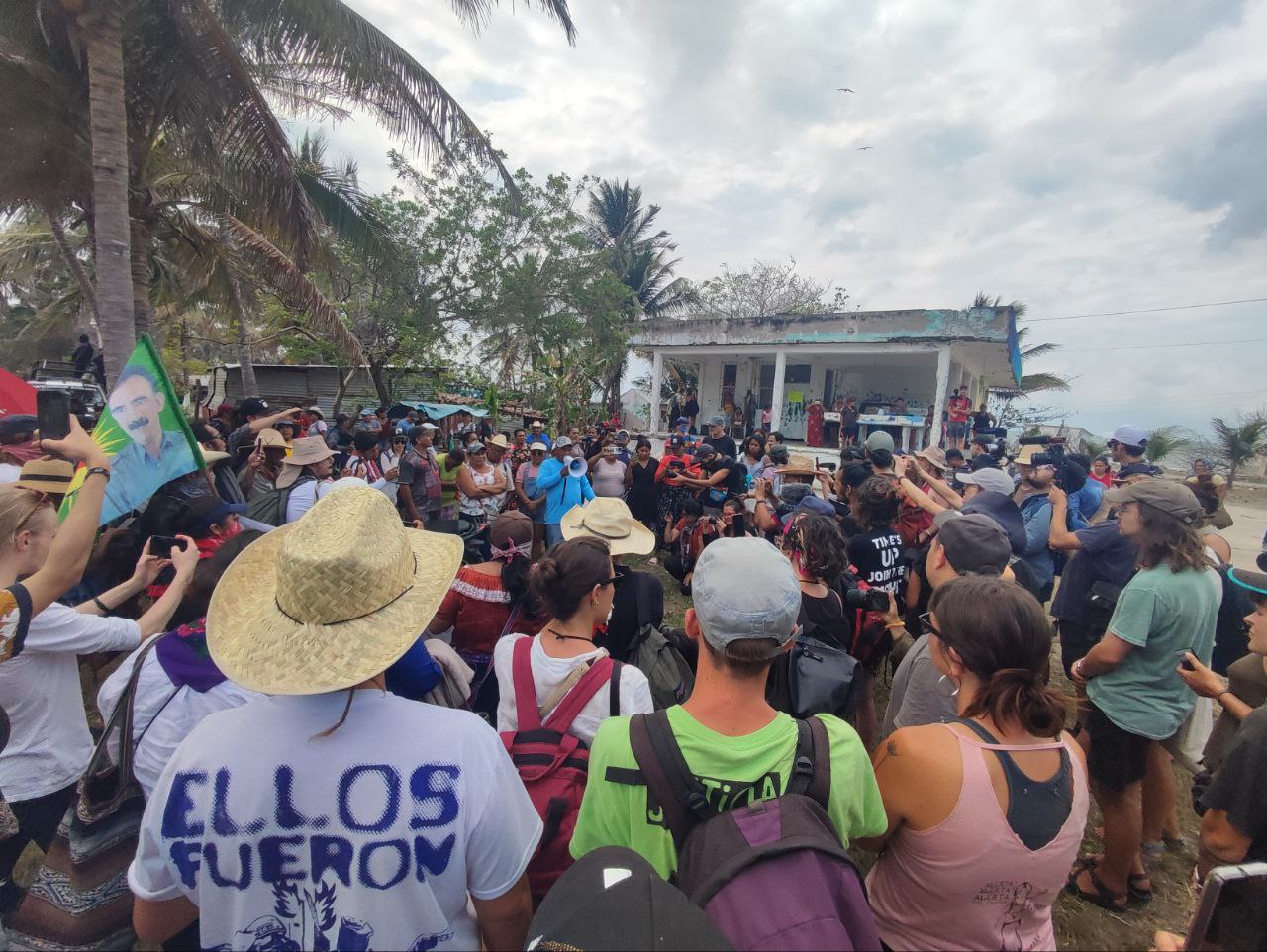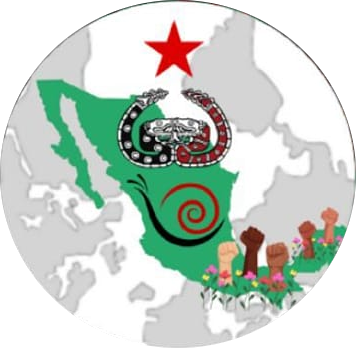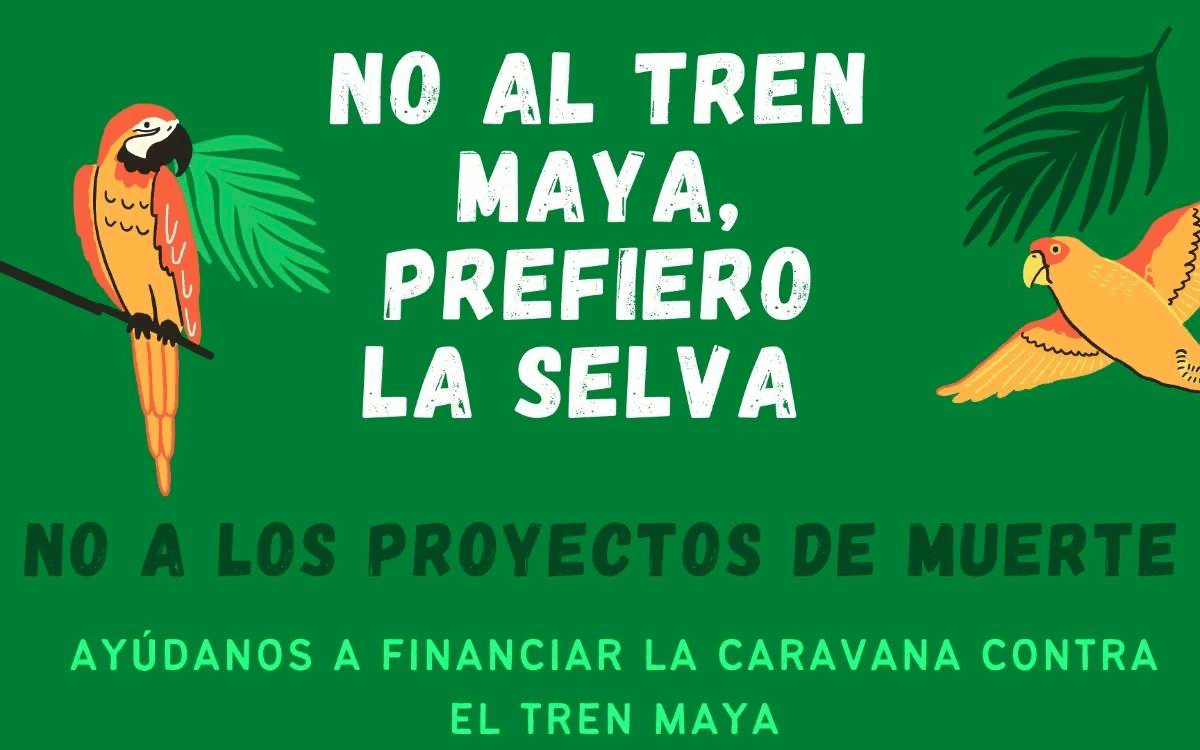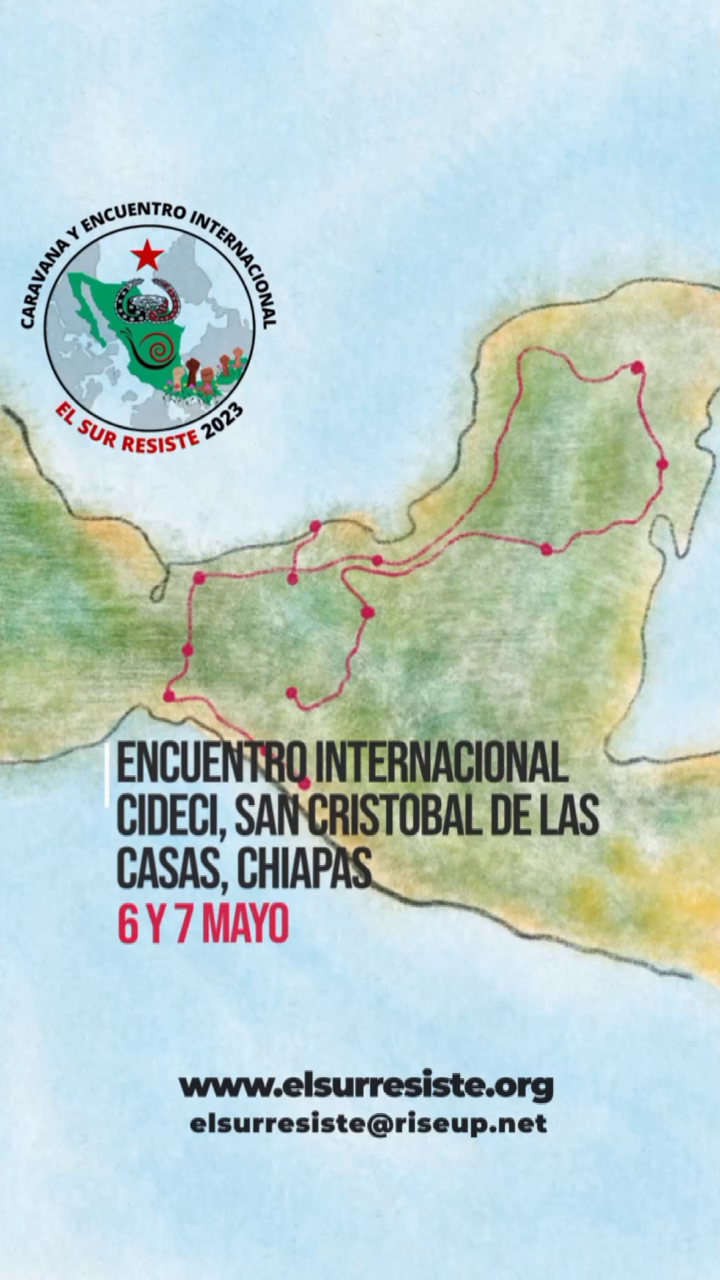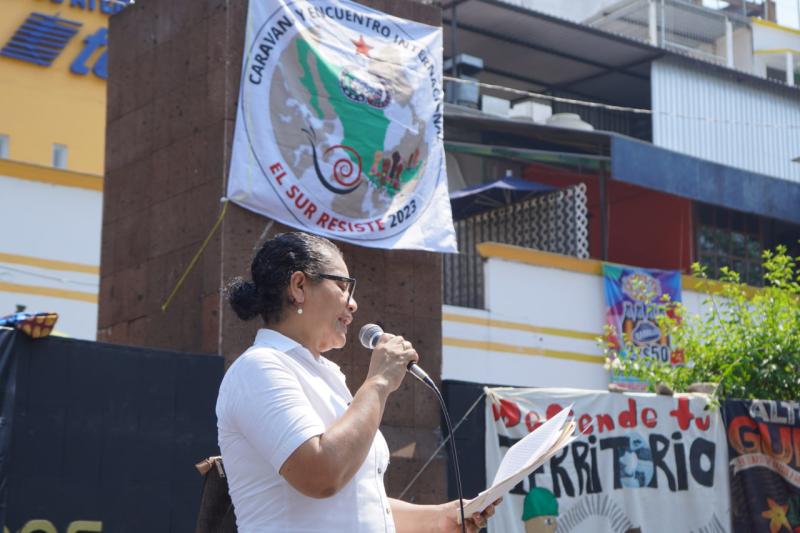
Villahermosa
The Caravan El Sur Resiste arrived at night to a warm welcome by a church that accompanies the organizational process of struggle with those below, the church of the parish of San Jose, which provided the compañeros with a space to spend the night with food and pozol. In the morning the Caravan moved to downtown Villahermosa, to hold a political-cultural gathering with local organizations.
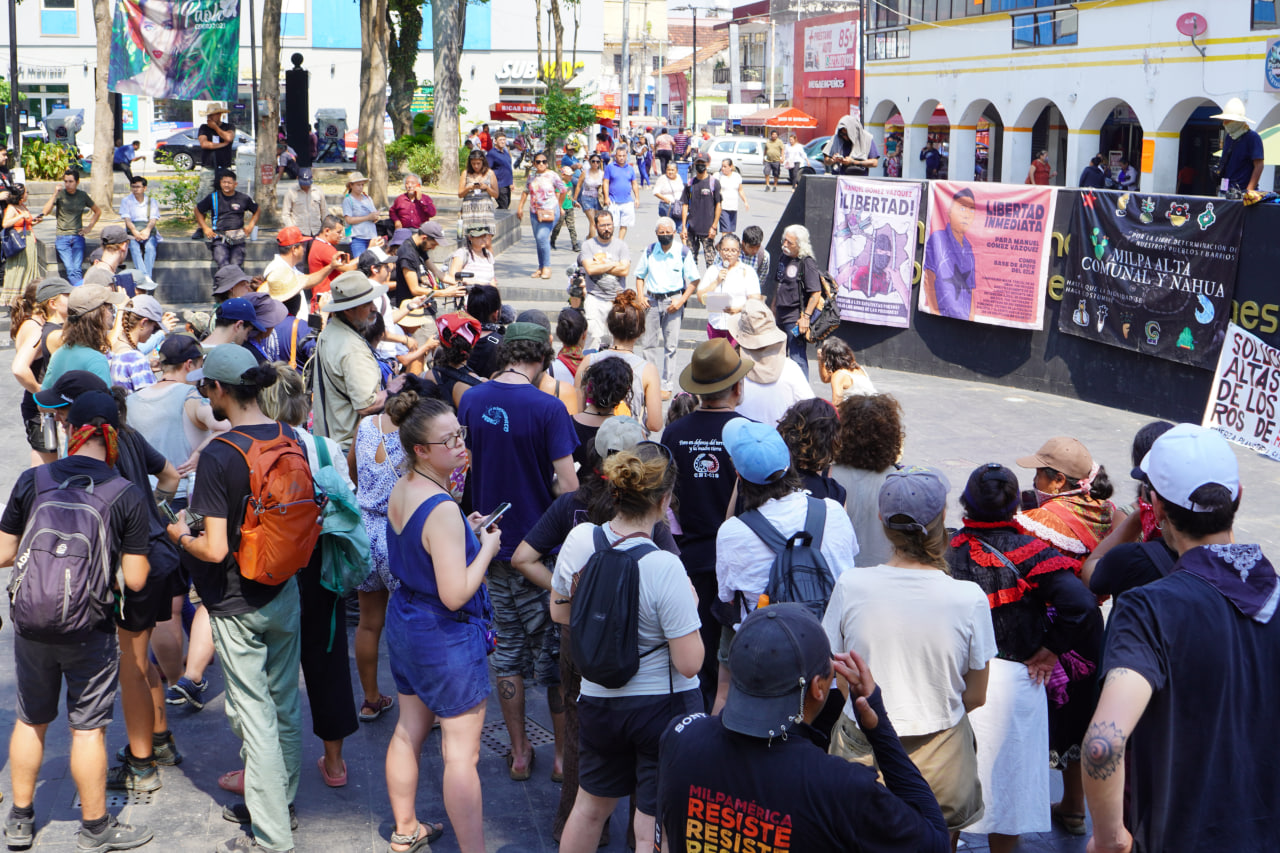
During the event, the contextualization that CODEHUTAB shared with us was one of optimism for the appointment of Adán Augusto López Hernández, who was said to radically transform the way of governing and received broad popular support, but who, once in power, abandoned the interests of popular representation and even going back on the rights of local legislation, promoted the initiative of the Garrote Law, which allowed the criminalization of social protest, this was approved during the new government, although with the support of CODEHUTAB it was achieved that the supreme court invalidated it as unconstitutional, the Dedazo Law was also promoted, harmful to democratic rights, approved and which proposes to replace the appointment of municipal delegates by popular election so that they are elected by the council of the city council.

The deterioration of the land and of the peasant and indigenous communities linked to it has been the responsibility of the hydrocarbon projects that are so abundant in this region, making soils and water increasingly contaminated, which directly affects agriculture, livestock and fishing, substantive activities of the communities. PEMEX, a state-owned company that operates in this region, has recorded and made public that from 2018 to 2022 there have been 84 spills and 11 leaks, mainly due to design and maintenance problems that deteriorate the region and that with the new Dos Bocas project under construction it would create even more damage.
Despite this adverse outlook, the organization adherent to the Sixth Declaration of the Lacandon Jungle: Corazón de Piedra Verde shared its words of encouragement and strength for territorial defense, which are an inherent part of the indigenous communities that exist throughout the Abya Yala. The effort of the Caravan to denounce and demonstrate the link between the megaprojects of the Mayan Train and the Interoceanic Corridor that seek to settle in one of the areas with the greatest amount of resources in the country and that the hegemonic discourse manipulates as a project for the peoples was welcomed when it is a dispossession project.
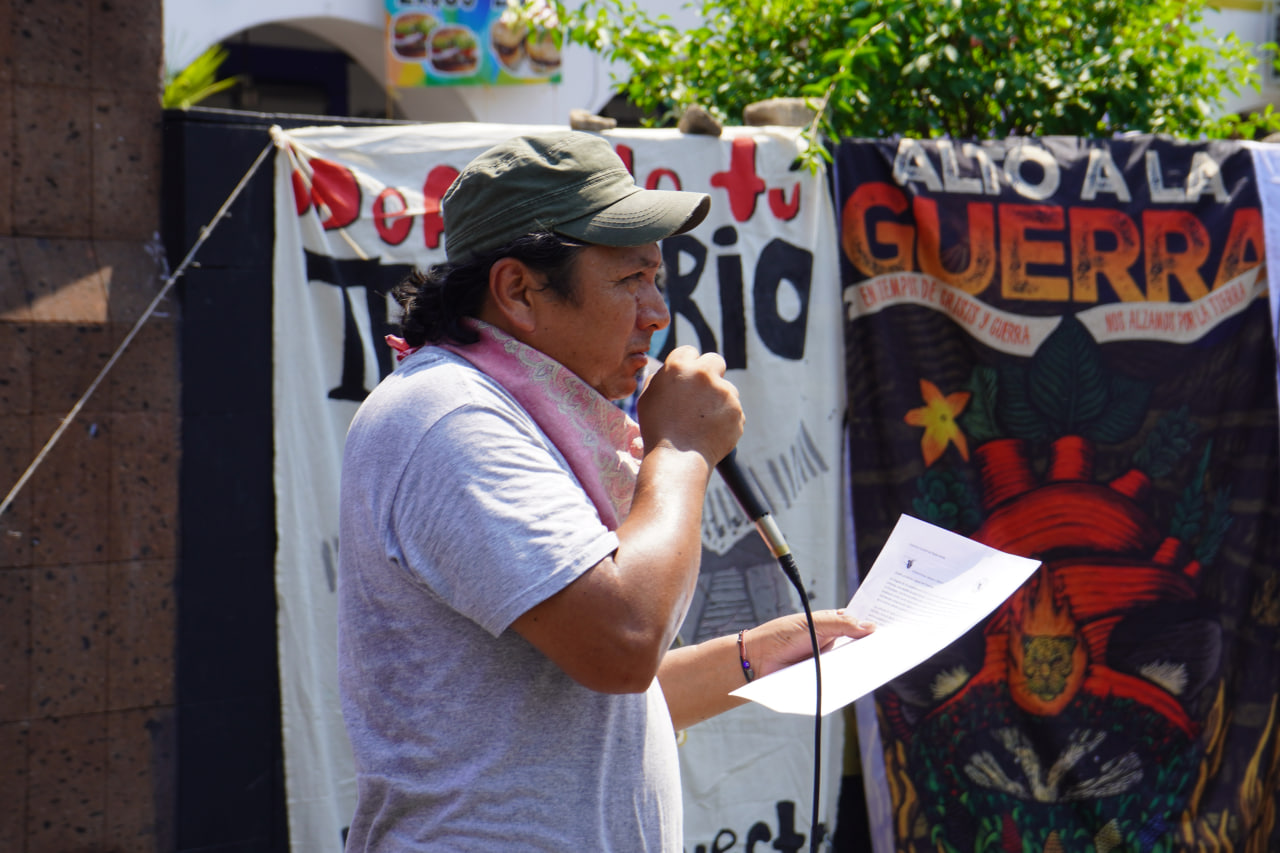
A fragment of Alfredo Viterio was shared that we reproduced below: “our territory is not a thing or a set of usable, exploitable things, nor is it a set of resources, our territory with its jungles, its mountains, its rivers, its lagoons and wetlands, with its sacred places where the protective gods live, with its black, red and sandy lands and its clays is a living entity that gives us life, provides us with water and air, cares for us, gives us food and health, gives us knowledge and energy, it gives us generations, and a history, a present and a future, it gives us identity and culture, it gives us autonomy and freedom, so along with the territory is life and along with life is dignity, along with the territory is our self-determination as towns.”
Thus, it was made clear that the peoples continue to receive the attacks of big capital and the deceptions of the false representatives of the people who obey particular interests, that the resistance against dispossession must be strengthened, interwoven and found to unite efforts for the preservation of their territory and therefore of its existence.
El Bosque
The Caravan El Sur Resiste arrived on its fifth day of travel to Colonia el Bosque, Tabasco, a community located between the Atlantic Ocean and the Grijalva River. El Bosque is in danger of disappearing because, since 2019, the sea level began to rise rapidly, destroying the coast, the streets, the kindergarten and the school, and dozens of homes.
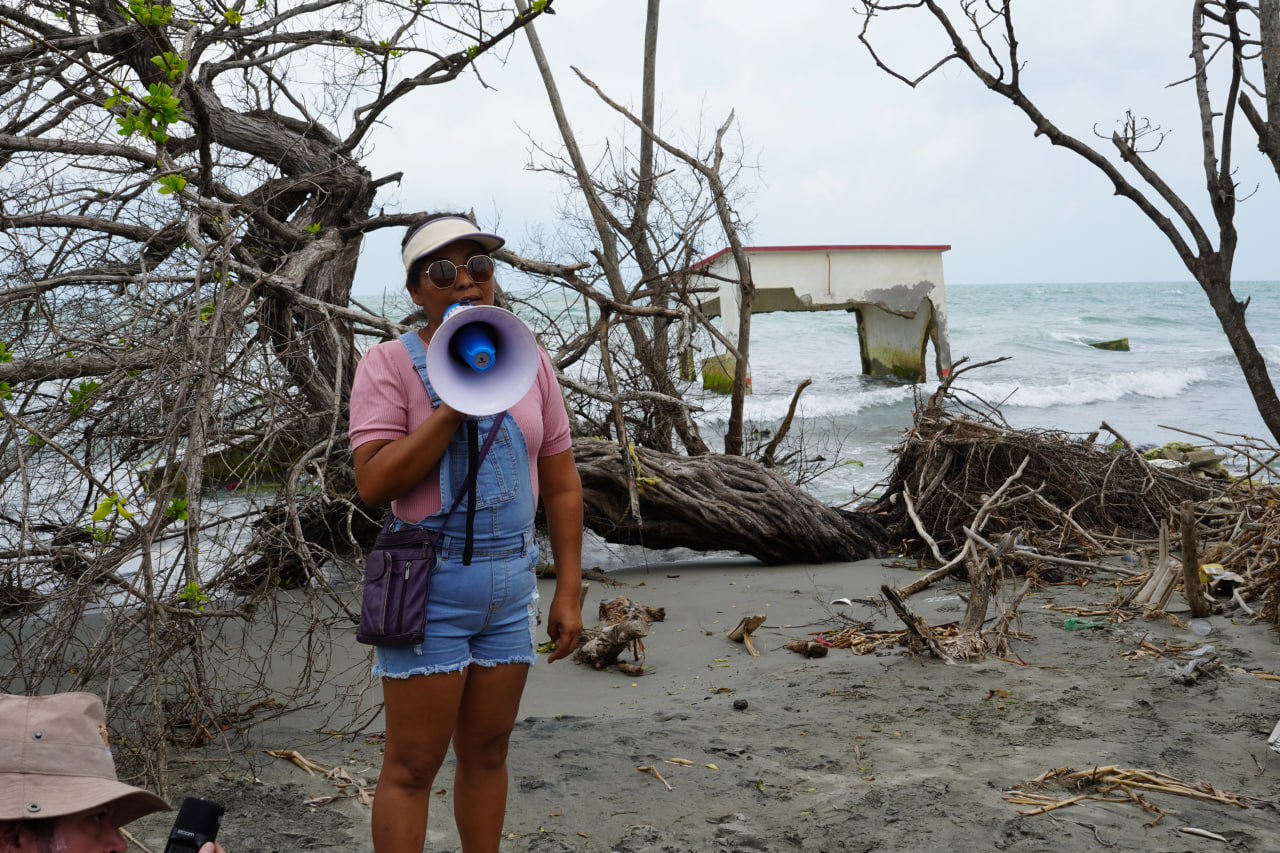
El Bosque is one of many communities around the world at risk of disappearing underwater due to rising sea levels caused by climate change. In Mexico, it is one of the first communities identified as displaced by this phenomenon.
Today there are few houses and buildings that survive the catastrophe in El Bosque, many families have been displaced and those that still resist demand the Federal Government support against the destruction of their community, their homes, their roots, and its whole way of life.
This is how Cristina Isabel Vicente and Estanilada Cardona explain it, who give us a tour of the community to show the buildings that are in the process of disappearing under the sea, and also tell us about their testimony and that of other members of the community who now expect the Federal Government to comply with the relocation plan that it promised to the families of El Bosque in February of this year.
“On November 10, 2022, a press conference was held here in El Bosque to publicize the terrible situation we are experiencing, and that was when we began to be heard by the media and authorities. From when that press conference was held, there is nothing left, everything has disappeared.
What we are asking for is relocation, we have already lost our homes, we are renting, lending, we are asking for relocation. The authorities have given us an answer, they say we are going to be relocated, but they say it takes time, we are talking about at least 60 people who need relocation.”
As we mentioned, El Bosque is not the only community around the world that is in danger of being devoured by the sea.
Cristina and Estanilada continue the tour through El Bosque, we stop in front of a building that is about to collapse. Behind, choppy seas and strong winds continue the process of eroding the building’s foundations. You can also see remains of other buildings between the waves, as well as trees and dry branches. There, Cristina explains to us that this building was her home.
“I want to share with you that this one in the back was my house… there were years of struggle to build it, and unfortunately, today I no longer have a home. It is very difficult for us to be displaced, it is very difficult to be in the fight now, but we will continue.”
Cristina joins in recounting her testimony, of what was her home, there is nothing left; an empty space and the waves of the sea are the only thing we can observe.
“I also lost my house, there was my house, and I lost it, I was left without a house, now that… with nothing, you can’t see it anymore, it is under the water.”
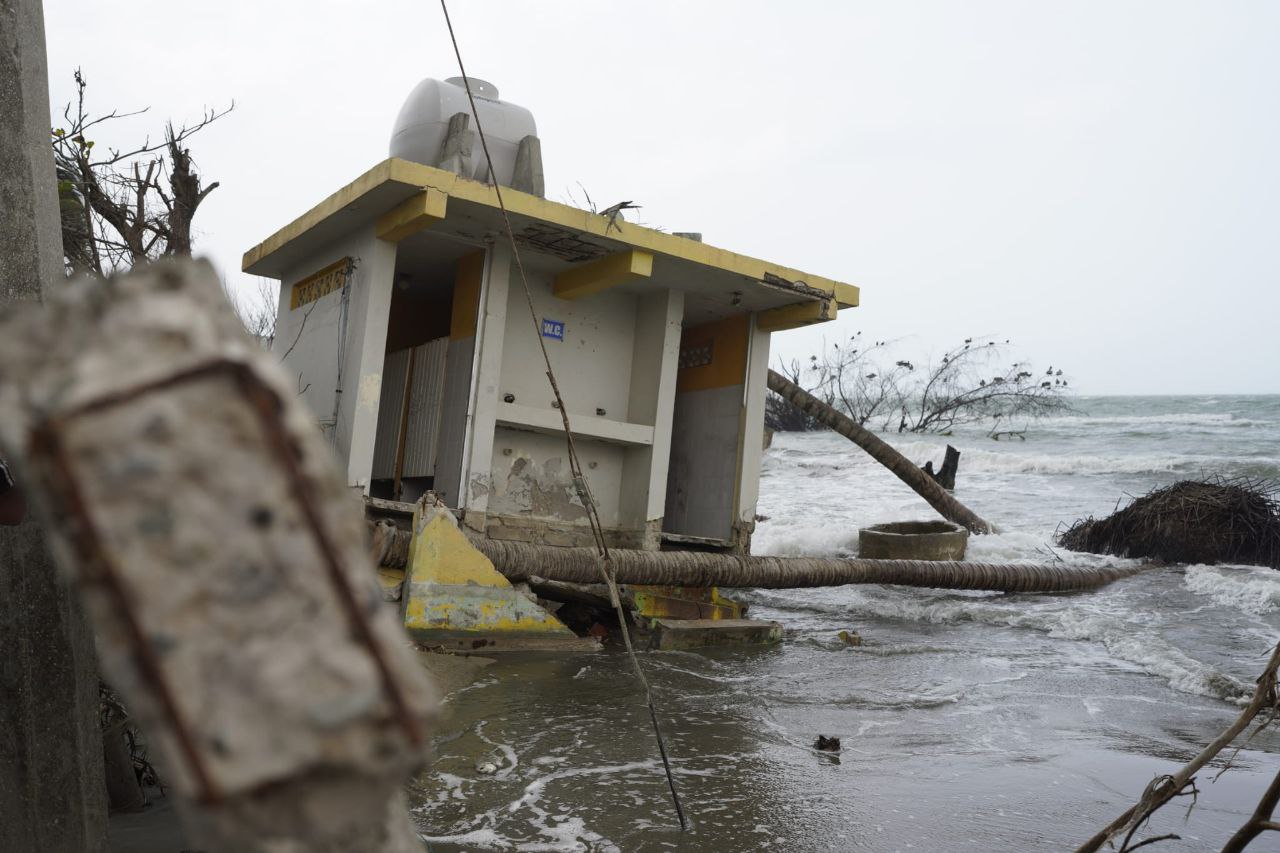
The relocation process
The few inhabitants of El Bosque who are still waiting to be relocated report that there is already contact with government institutions, SEDATU and SEMARNAT are the ones that have maintained contact with the community since February 2023.
However, the families still do not have a possible date to be relocated and they are not aware of the place to which they would be relocated, much less the extension of the land they will receive.
Cristina and Estanilada comment that the community hopes to be able to stay close to the sea, since they are a people that have historically dedicated themselves to fishing and the sea is their source of food and economic support.
“We live from fishing, that is why we want to ask if it can be in a place where we can do that, everything is worrying, very worrying, we do not know where we are going, or when.
We do talk as a community, we sit down, we talk over coffee and bread, because they say that pain with bread is less. We get very unwell as a community, the nights are very worrying, we spend our time thinking about the sea, that sea that already scares us that it will rise more. There were points at 3am, and at 4am that we took out belongings from people because the sea has already risen, and it does hit us as a community.”
In addition to living day and night with the worry that more houses and spaces will disappear under the sea, the situation of services in the community worsens day by day.
Cristina tells us that most families have lost the refrigerators in their homes that have broken down in the process, this not only makes it difficult for families to keep their food for longer, but also makes it difficult for diabetes medicines to be kept refrigerated. The light poles also begin to give way to the waves; the community could lose electrical access service at any time.
“The entire community almost lost their refrigerators. I have diabetes, for example, I have nowhere to store my insulin. Yesterday I brought an ice bar, but I don’t know if I can bring it every day. We are okay with the relocation, but we have urgent needs for the time being.”
When talking with some people from the community, they mention that they understand that the relocation process can be long and complicated, however, they hope that there may be another type of plan while they hope that it can lessen the crisis situation that is being experienced in the community.
Despite the fact that the global warming process has been identified as a priority in international politics due to the impacts it will generate on the human security of millions of people worldwide, the Government of Mexico does not have any kind of public plan or policy proposal that seeks to stop this process.
Nor is there a plan to care for the victims of natural catastrophes that are already beginning to appear, as the case of the El Bosque community suggests, and which will soon multiply throughout the national territory if the causes of the climate crisis are not addressed: devouring capitalism that continues with an unlimited production process at the cost of the environment and the life of every living being on the planet.
During the tour, Cristina and Estanilada stop in front of another building in the process of collapse, this was the community school, the kindergarten has also disappeared. Now the children left in the community go to school only 6 hours a week in a small building with a tin roof.
The life of the community, not only of its buildings, has also been gradually devoured by the sea.
The loss of the roots of a community
Cristina and Estanilada continue leading the route, we walk for approximately one kilometer; the sea is choppy and the air blows hard; Today another North entered, changing the weather conditions of the place that is usually sunny and the sea calm.
We arrive at where the Grijalva river joins the Atlantic sea, where Cristina and Estanilada stop, as well as boys, girls, adolescents, women and men from the community. There they point us to a concrete plate that can barely be seen above the water.
The iron used to be a pier, and the meeting point of the whole community; there the families met to fish, the activity that for generations has shaped the identity of the people who live there and their source of food and economy.
Currently, the pier no longer exists, fishing has almost disappeared and with it, all the activities that were carried out there, as well as the livelihood of the families, this is the testimony offered by Cristina:
“Most of the people came to fish, this was like a flea market. We all came with blankets and our children would sleep here and we would go fishing, we would take the product to sell and in the afternoon go fishing again. That no longer happens, there is no longer the production that there was before, it has already been lost, this compañeros was our roots, I feel sad, I feel that climate change is taking away our roots. It is something very sad, we know that if one day a harsher north or a hurricane enters, we can disappear overnight.
This was a well-structured dock, but it has been lost, sinking, here we fished, we organized parties. I never imagined what would happen to us, when they said climate change, it sounded like a distant voice, when I heard that I thought of the people in the city with their cars, and not of us who live without pollution. The change is not caused by us, but we are going to pay for it, today is us, but tomorrow it’s going to be others.”
Cristina is right, the Original Peoples, the peasant peoples, the communities in the southern continents, such as Mexico and Latin America, and specifically, the Original Peoples, the peasant peoples, and the poor people, will be the ones who suffer the worst consequences of the natural events that global warming will generate worldwide, or rather, those who already pay for those consequences.
However, the global north has been responsible for generating the climate crisis we are experiencing and specifically it is the population of the global north that is responsible for generating millionaires at the cost of millions of human lives.
What happens in El Bosque is not a spontaneous phenomenon, worldwide the need for public policies that put the Native, peasant, and fishing communities at the core of the discussion on global warming has been placed at the center. They are the ones that have managed to protect the last lungs and natural areas conserved worldwide, and also the ones that will suffer the most from the effects of global warming.
The very deep relationship that Native peoples have with the environment of the territory they inhabit makes the identity, economy, and community life of the peoples closely linked to the survival of their territory.
As in Puente Madera, Oaxaca, the community explains that if the Pitillal is destroyed to build an Industrial Park, since it is their current source of life; The same happens in El Bosque with the loss of fishing as a vital activity.
For this reason, government solutions globally – and in Mexico – need to be deep and system-wide; there is no life that survives the devouring capitalism and its death machine.
We end the visit and documentation in El Bosque with a meal that the families of El Bosque prepare with effort and solidarity. Despite the uncertainty, pain, destruction, and concern they have experienced in recent years, there is still hope, solidarity, and resistance in their eyes and their actions.
The boys and girls laugh and play in the water, the women talk and converse among themselves, the community of El Bosque resists and keeps on fighting.
